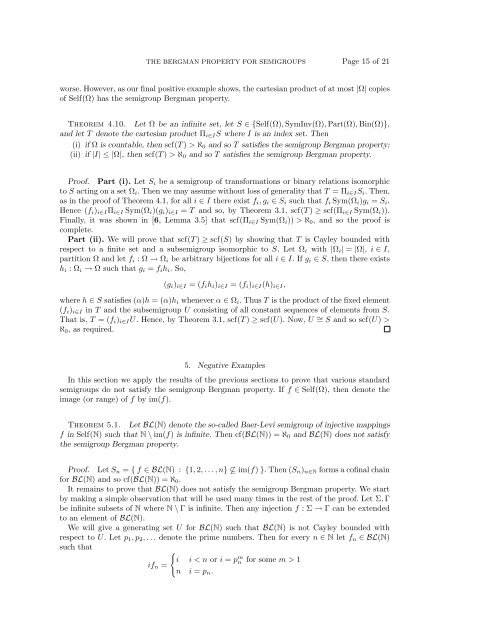The Bergman property for semigroups
The Bergman property for semigroups
The Bergman property for semigroups
You also want an ePaper? Increase the reach of your titles
YUMPU automatically turns print PDFs into web optimized ePapers that Google loves.
THE BERGMAN PROPERTY FOR SEMIGROUPS Page 15 of 21<br />
worse. However, as our final positive example shows, the cartesian product of at most |Ω| copies<br />
of Self(Ω) has the semigroup <strong>Bergman</strong> <strong>property</strong>.<br />
<strong>The</strong>orem 4.10. Let Ω be an infinite set, let S ∈ {Self(Ω), SymInv(Ω), Part(Ω), Bin(Ω)},<br />
and let T denote the cartesian product Π i∈I S where I is an index set. <strong>The</strong>n<br />
(i) if Ω is countable, then scf(T ) > ℵ 0 and so T satisfies the semigroup <strong>Bergman</strong> <strong>property</strong>;<br />
(ii) if |I| ≤ |Ω|, then scf(T ) > ℵ 0 and so T satisfies the semigroup <strong>Bergman</strong> <strong>property</strong>.<br />
Proof. Part (i). Let S i be a semigroup of trans<strong>for</strong>mations or binary relations isomorphic<br />
to S acting on a set Ω i . <strong>The</strong>n we may assume without loss of generality that T = Π i∈I S i . <strong>The</strong>n,<br />
as in the proof of <strong>The</strong>orem 4.1, <strong>for</strong> all i ∈ I there exist f i , g i ∈ S i such that f i Sym(Ω i )g i = S i .<br />
Hence (f i ) i∈I Π i∈I Sym(Ω i )(g i ) i∈I = T and so, by <strong>The</strong>orem 3.1, scf(T ) ≥ scf(Π i∈I Sym(Ω i )).<br />
Finally, it was shown in [6, Lemma 3.5] that scf(Π i∈I Sym(Ω i )) > ℵ 0 , and so the proof is<br />
complete.<br />
Part (ii). We will prove that scf(T ) ≥ scf(S) by showing that T is Cayley bounded with<br />
respect to a finite set and a subsemigroup isomorphic to S. Let Ω i with |Ω i | = |Ω|, i ∈ I,<br />
partition Ω and let f i : Ω → Ω i be arbitrary bijections <strong>for</strong> all i ∈ I. If g i ∈ S, then there exists<br />
h i : Ω i → Ω such that g i = f i h i . So,<br />
(g i ) i∈I = (f i h i ) i∈I = (f i ) i∈I (h) i∈I ,<br />
where h ∈ S satisfies (α)h = (α)h i whenever α ∈ Ω i . Thus T is the product of the fixed element<br />
(f i ) i∈I in T and the subsemigroup U consisting of all constant sequences of elements from S.<br />
That is, T = (f i ) i∈I U. Hence, by <strong>The</strong>orem 3.1, scf(T ) ≥ scf(U). Now, U ∼ = S and so scf(U) ><br />
ℵ 0 , as required.<br />
5. Negative Examples<br />
In this section we apply the results of the previous sections to prove that various standard<br />
<strong>semigroups</strong> do not satisfy the semigroup <strong>Bergman</strong> <strong>property</strong>. If f ∈ Self(Ω), then denote the<br />
image (or range) of f by im(f).<br />
<strong>The</strong>orem 5.1. Let BL(N) denote the so-called Baer-Levi semigroup of injective mappings<br />
f in Self(N) such that N \ im(f) is infinite. <strong>The</strong>n cf(BL(N)) = ℵ 0 and BL(N) does not satisfy<br />
the semigroup <strong>Bergman</strong> <strong>property</strong>.<br />
Proof. Let S n = { f ∈ BL(N) : {1, 2, . . . , n} ⊈ im(f) }. <strong>The</strong>n (S n ) n∈N <strong>for</strong>ms a cofinal chain<br />
<strong>for</strong> BL(N) and so cf(BL(N)) = ℵ 0 .<br />
It remains to prove that BL(N) does not satisfy the semigroup <strong>Bergman</strong> <strong>property</strong>. We start<br />
by making a simple observation that will be used many times in the rest of the proof. Let Σ, Γ<br />
be infinite subsets of N where N \ Γ is infinite. <strong>The</strong>n any injection f : Σ → Γ can be extended<br />
to an element of BL(N).<br />
We will give a generating set U <strong>for</strong> BL(N) such that BL(N) is not Cayley bounded with<br />
respect to U. Let p 1 , p 2 , . . . denote the prime numbers. <strong>The</strong>n <strong>for</strong> every n ∈ N let f n ∈ BL(N)<br />
such that<br />
{<br />
i i < n or i = p m n <strong>for</strong> some m > 1<br />
if n =<br />
n i = p n .
















